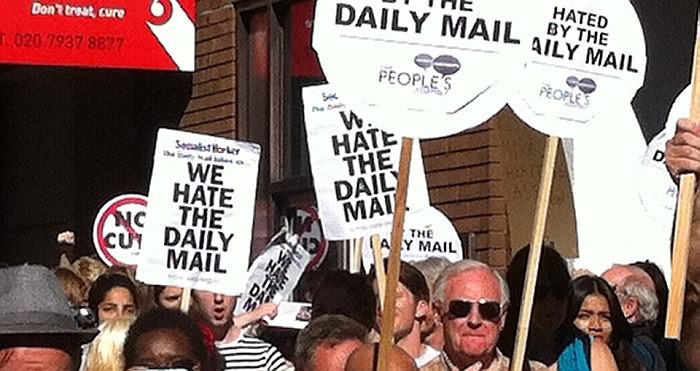

A new report published by the Media Reform Coalition (MRC) shows that right across the board – from news websites to the press, TV channels to radio stations, search engines to mobile apps – the UK media is controlled by a handful of giant corporations. The MRC argues that the UK suffers from endemic levels of concentration in news and information markets, which threaten to choke democratic debate through unaccountable political influence and sheer lack of diversity.
Drawing on original research and pulling together a wide range of industry sources, the 20 page report, ‘Who Owns the UK Media?’, reveals a landscape that is far from pluralistic. For example, just three companies – Rupert Murdoch’s News Corp, The Daily Mail group and Trinity Mirror – control over 70% of the national newspaper market, a market that may be shrinking but is still crucial when it comes to setting the agenda for the rest of the media – a phenomenon that was accentuated in the pro-Conservative coverage of the parties in the 2015 British General Election.
The situation is not that much better when newspapers’ online readers are included, with four companies controlling over 65% of the total market.
The result of these levels of concentration is that a small number of corporations are able to wield huge amounts of unchecked power as we saw during the Leveson Inquiry hearings in 2012. The Leveson Inquiry was a judicial inquiry, carried out publicly in 2011 and 2012, into the practices of the British press following the News International phone hacking scandal. It was chaired by Lord Justice Leveson. This is a media environment dominated by massive conglomerates and a few wealthy individuals such as Rupert Murdoch and Lord Rothermere who have well-established conservative perspectives on key questions affecting public life such as foreign policy, immigration and austerity and intimate relationships with senior politicians.
When MRC published the report a week ago, it showed that six companies account for over 80% of local newspaper titles and over 86% of revenue. However, in the last few days, Trinity Mirror have bought the regional press portfolio of Local World for £160 million (US$ 244 million), which means that the situation is even more disastrous. Local news in the UK is split between ‘news deserts’ – where professional journalists have been drained away by cuts and closures – and widespread local monopolies or duopolies. A total of 36 million U.K. citizens, or 57% of the population, have no daily paper that can scrutinize court cases and local council meetings. Meanwhile 43% of Local Government Areas rely on just a single title for their reporting. This presents U.K. citizens with a potentially significant democratic deficit in terms of holding local centers of power to account.
Commercial radio in the U.K. reveals a similar lack of plurality with two of the three national stations owned by the same two companies that dominate local radio with close to 40% of analogue licenses. What is particularly concerning is that almost all radio news (whether public or commercial) is provided by just two wholesale outlets: the BBC and Sky.
The television landscape is also dominated by a handful of large corporate giants. While the BBC – currently undergoing Charter Review and the prospect of a 20% budget cut over the next five years – has a 33% share of viewing, it is the pay TV operator Sky (part owned by Rupert Murdoch’s Fox) that has by far the largest revenues. By 2020, it is expected that Sky will have more than double the revenue of the BBC even though the publicly funded broadcaster accounts for the largest share of original UK production.
The report sounds a note of caution about online diversity, noting how UK search is overwhelmingly dominated by Google, while the most popular apps like Instagram and WhatsApp are owned by Facebook, itself by far the most popular social media site.
The report concludes that the high level of concentration in many media markets in the U.K. is a matter for urgent policy action. It suggests that the long-established policy principle that public responsibilities should be attached to significant media power should be applied across all media platforms.
Among the remedies being proposed by the Media Reform Coalition are clear ownership thresholds, safeguards to ensure journalistic and editorial autonomy, arms-length funding for community news and independent start-ups, and a more transparent regime of reporting high level contacts between government and media interests.
Some people like to downplay the importance of media ownership in a digital climate. MRC’s report insists that this is not the case at all. The point is that if we want to see elections and referenda, as well as economic debates and military interventions, covered in a way that does not simply favor the most powerful voices in the land, then we need an open and honest debate on media ownership that leads to real remedies and not empty rhetoric.
Photo: Ninian Reid
Two intrepid journalists embarked on an investigation into the unjust conviction of a Czech man,…
Every year, a journalism class at a Vienna-based university unearths attention-grabbing stories. The idea of…
The decision sets a dangerous precedent, giving authorities the power to fine media as they…
With the foundation recognized as a major supporter of independent journalism, its decision is bad…
The closure of Tele Liban raises concerns about the future of the station and its…
The arrest of Mehdi and Majid Nikahd serves as a stark reminder of the challenges…